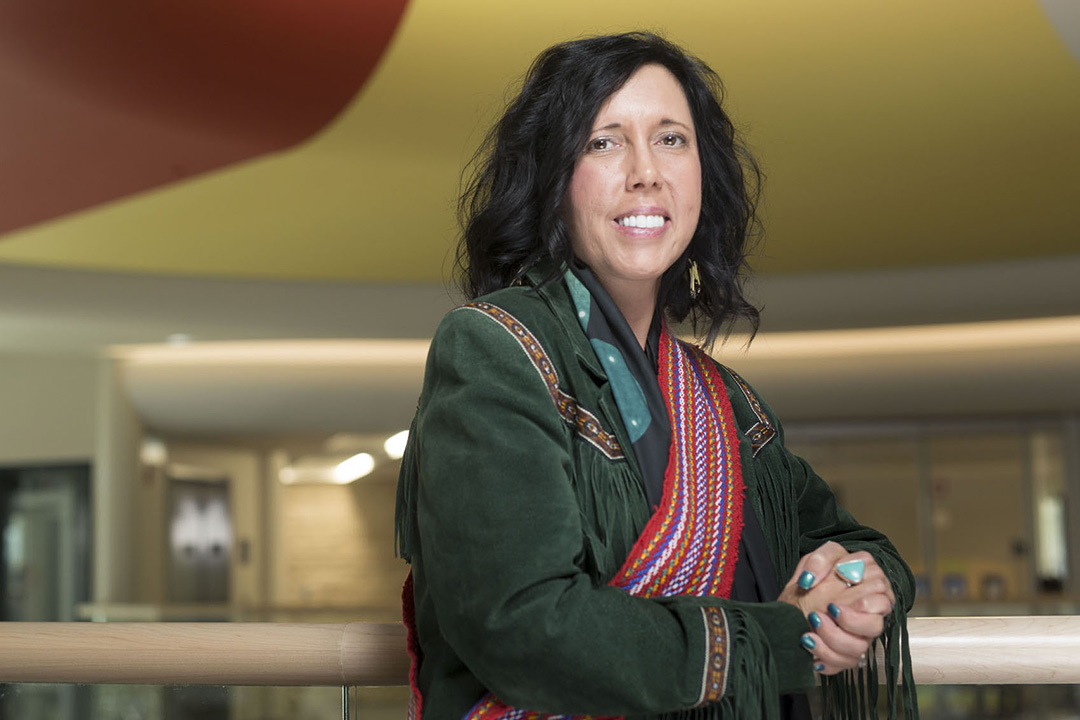
Bourassa envisions exciting future for IIPH at U of S
Relocating the national Institute of Indigenous Peoples’ Health (IIPH) to the University of Saskatchewan (U of S) from Sudbury, Ont., opens up exciting opportunities for both the institute and the university to advance health research and reconciliation, according to IIPH Scientific Director Carrie Bourassa.
By Sarath PeirisThe Oct. 1 move to U of S enables the institute, one of 13 of the Canadian Institutes of Health Research (CIHR), to continue serving northerners as well as other Indigenous populations and advance the institute’s leading role to improve and promote First Nations, Métis and Inuit health through research.
“The University of Saskatchewan is a pretty amazing hub of activity in Indigenous health, and has great infrastructure in place,” said Bourassa, who joined the College of Medicine as a faculty member Sept. 1. “It is a natural fit for the institute.”
Hosting the IIPH will build upon the university’s strengths and profile as a growing hub for Indigenous health research, said Bourassa, who will split her time evenly between the U of S and IIPH.
“IIPH develops partnerships nationally and internationally, so although we don’t generate research directly, we help to create a positive research environment that helps to recruit and retain Indigenous health scholars, and engage and support Indigenous communities in Indigenous health research,” she said.
The U of S is a longstanding partner in the Indigenous Peoples’ Health Research Centre, along with the First Nations University of Canada and the University of Regina. In 2017, the U of S appointed its first research chair in Indigenous health, Dr. Alexandra King, who holds the Cameco Chair in Indigenous Health.
Bourassa said IIPH will support the U of S-based Saskatchewan Centre for Patient-Oriented Research (SCPOR) by providing consultation and advice, engaging with CIHR-funded researchers on knowledge translation, and making connections with other researchers and community members. SCPOR’s Scientific Director Malcolm King, recruited last year to the College of Medicine, was formerly scientific director at IIPH.
Bourassa plans to begin working with graduate students at U of S next year. She still supervises two graduate students in Sudbury and one in Regina, where she was a professor in Indigenous Health Studies at First Nations University of Canada for more than 15 years before joining IIPH.
As a researcher in community health and epidemiology, she hopes to move the Cultural Safety Evaluation, Training and Research Laboratory, for which she was awarded $205,000 by the Canada Foundation for Innovation in 2016, to the U of S from the Health Sciences North Research Institute in Sudbury next year.
Cultural safety involves addressing institutional discrimination, racism and the effects of colonization, and examines how personal biases, authority and privilege of non-Indigenous health-care providers can influence their relationship with Indigenous patients. The lab aims to create a standard for culturally safe environments from a patient’s perspective, evaluate effectiveness from an Indigenous perspective, undertake research specific to cultural safety, and evaluate health programs for harmful cultural practices.
Bourassa expects to launch the new IIPH strategic plan early in the new year, along with detailed findings from the Canada-wide community engagement process the institute recently undertook. That process indicated a strong desire by Indigenous people for self-determination and to set their health research agenda, Bourassa said.
“A lot of communities are research savvy, and they are telling us what works and what doesn’t when they apply for grants. They want an option for community members, Elders and Knowledge Keepers to be able to hold grants and lead grants,” Bourassa said. “If we are talking about reconciliation, then that means communities need to be in leadership roles. It’s time to realize that communities that live and breathe the issues also have solutions.”

